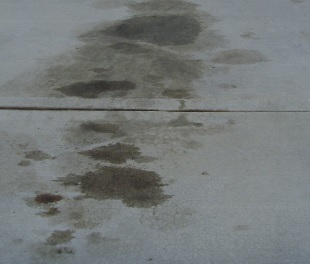If you were to search for an oil repellent sealer you would see that there aren’t a lot of products that come up in search results, and the ones that do, don’t actually repel oil and stop oils from staining concrete. If you are looking to buy an oil repellent concrete sealer, there are a few things that you should keep in mind:
- There is no such thing as an oil repellent sealer. While certain sealers may buy you a minute or less to clean the concrete, penetrating sealers are not capable of stopping oil stains. Why? Penetrating sealers penetrate into the surface of the concrete where they chemically react to form a barrier within the pores. With silicates, the barrier is crystalline, and with Silane-Siloxane sealers, the barrier is hydrophobic. It is important to keep in mind that because penetrating sealers work within the pores, they leave the surface of the concrete exposed. If oil is spilled onto the surface of concrete sealed with a penetrating sealer, the oil can hit the exposed concrete on the surface and stain the exposed concrete. A sealer will slow down the absorption of the oil through the pores, but it won’t stop it and it won’t stop the oil from staining the surface. In some cases, the oil will cause the sealer to breakdown.
- The only thing that will stop oil is a coating. The only thing that will stop oil is a coating, but not all coatings offer the same resistance to oil. The three most popular types of coatings are acrylic sealers, epoxy coatings, and urethane coatings. Epoxy and Urethane coatings offer the most resistance to oil, Urethanes being the toughest. Acrylic sealers will stop oil from staining the concrete, but oil will soften an acrylic coating to the point where it may need to be repaired. Acrylic sealers can be applied to interior and exterior concrete, but epoxy and urethane coatings should only be applied to interior concrete surfaces.
Can a Sealer Reduce Oil Stains?
Yes and no. A sealer will never be able to stop oil stains from forming on the surface. When the oil hits the exposed concrete it will stain it. Penetrating sealers form a barrier within the pores and the barrier may slow down the movement of the oil, but they won’t stop the oil from penetrating. As the oil moves through the concrete, it will stain what it touches. It can also cause the sealer in the pores to deteriorate. While you may have a minute of relief, there is still a 99.99% chance that the oil stain will be permanent and have to be removed with a cleaner.
So what about the penetrating sealers that say they repel oil? Concrete, sealers, and oil are all very predictable. They function in a very particular way. Water repellent sealers repel water and water based products, but oil based products can penetrate through a water repellent barrier. This is why an oil based acrylic sealer can easily be applied over concrete sealed with a water repellent. Water repellent sealers protect against water but they don’t protect against oil. The same goes for silicate densifiers. Silicate densifiers increase the strength of the concrete and are not capable or repelling water or solvent based liquids. Oil will penetrate right through a silicate barrier.
There is no such thing as a miracle sealer that will stop oil stains from forming on the surface. The only thing that can stop oil stains is a coating. As mentioned above, sealers can slow down the movement of oil through the pores (temporarily), but the exposed concrete will stain. If you are considering purchasing a sealer based on the claim that it is able to repel oil, I would talk to the manufacturer and find out what their guarantees are, then test the product in a small inconspicuous area. Seal the concrete and let it dry, then spill oil over the sealed area. Let is sit for 2-45 minutes and clean the area. The longer you let it sit, the more realistic the test environment. Most homeowners don’t realize they have had an oil spill until 24 ours after parking the car.
How Can I Stop Oil From Staining My Concrete?
The best way to stop oil from staining concrete is with a coating. The three most common types of coatings are acrylic sealers, epoxy coatings, and urethane coatings.
- Acrylic Sealers: Acrylic sealers are the most common type of outdoor coating, but they are commonly used indoors as well because of how easy they are to apply and maintain. Acrylic sealers will protect oil from staining the concrete, but the acrylic sealer will take some abuse. If the oil stains are left on the acrylic sealer, the acrylic sealer will need to be repaired. For exact estimates, refer to the technical data sheet of the product you are considering.
- Epoxy Coatings: Epoxy coatings are a step up from acrylic sealers but they should not be applied to exterior surfaces as they don’t offer UV resistance and will yellow. Epoxy coatings are more resistant to oil, but if oil is left on the surface for a long period of time the oil can break down the coating. For exact estimates, refer to the technical data sheet of the product you are considering.
- Urethane Coatings: Urethane coatings, specifically aliphatic urethane coatings, are the most resistant to oil. Like with all coatings, oil can break down the coating over time, but for the most part, it will take a while for oil to break down a urethane coating. For exact estimates, refer to the technical data sheet of the product you are considering.
How Can I Clean Oil Stains?
There are dozens of ways in which you can remove oil stains from your concrete. There are “natural” ways to remove oil, and then there are oil cleaners.

